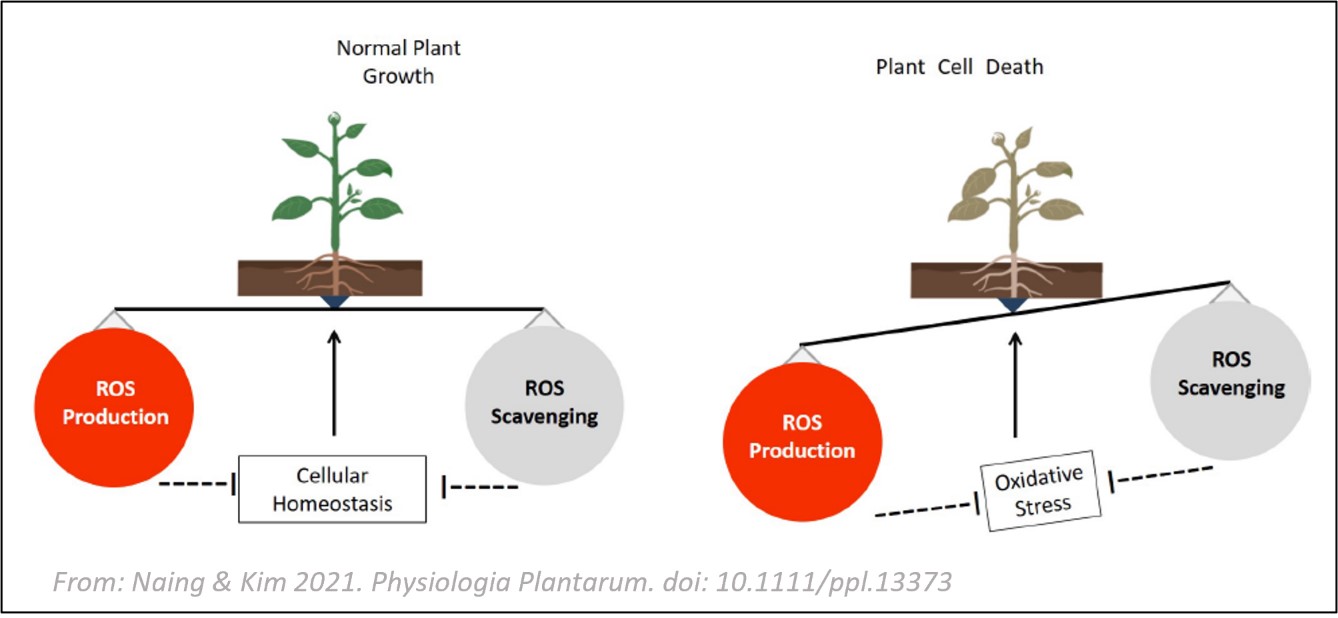Edith Stabentheiner (Graz): Plants have to cope with tremendous challenges due to climate change and global warming. Heat, drought and soil salinization are just a few of them with increasing global relevance in the next years and decades. Stress often leads to an increased production of reactive oxygen species (ROS) followed by oxidative stress and finally resulting in oxidative damage. However, ROS are Janus-faced molecules and redox regulation and thus production and scavenging of ROS is part of nearly every aspect in plant development and interaction with the environment. The antioxidative defence system consists of low molecular water or lipid soluble antioxidants (e.g., ascorbate, glutathione, proline, tocopherol) and several enzymes (e.g., peroxidase, catalase, superoxide-dismutase) – these components are often used to identify and to qualitatively and quantitatively evaluate oxidative stress. But there is a huge variation in reports on antioxidant activities and possible oxidative damage, thus tolerating a wide scope in the interpretation of stress scenarios. Reliable and informative stress markers, however, are crucial for better understanding what´s going on in plants exposed to stressful situations. The lecture will give an introduction into current research dealing with oxidative stress in plants.
Beginn des Seitenbereichs:
Seiteneinstellungen:
Ende dieses Seitenbereichs. Zur Übersicht der Seitenbereiche
Beginn des Seitenbereichs:
Suche:
Schließen
Ende dieses Seitenbereichs. Zur Übersicht der Seitenbereiche
Suchen
Beginn des Seitenbereichs:
Hauptnavigation:
Seitennavigation:
- Universität
Universität
Lösungen für die Welt von morgen entwickeln – das ist unsere Mission. Unsere Studierenden und unsere Forscher:innen stellen sich den großen Herausforderungen der Gesellschaft und tragen das Wissen hinaus. - Forschungsprofil
Forschungsprofil
Wissenschaftliche Exzellenz und Mut, neue Wege zu gehen. Forschung an der Universität Graz schafft die Grundlagen dafür, die Zukunft lebenswert zu gestalten. - Studium
Studium
Wo ist der beste Ort zum Studieren? An der Uni Graz. In einer inspirierenden Atmosphäre des Lernen und Forschens. Mit rund 120 Studien zur Auswahl. Für deinen Weg in die Zukunft. - Community
Community
Die Universität Graz ist Drehscheibe für internationale Forschung, Vernetzung von Wissenschaft und Wirtschaft sowie für Austausch und Kooperation in den Bereichen Studium und Lehre. - Spotlight
Ende dieses Seitenbereichs. Zur Übersicht der Seitenbereiche
Beginn des Seitenbereichs:
Sie befinden sich hier:
Ende dieses Seitenbereichs. Zur Übersicht der Seitenbereiche
17.01.2023
17:00 - 18:30
Institut für Biologie
[0031OG0002] Hörsaal HS 31.11, Schubertstraße 51, Obergeschoß
Beginn des Seitenbereichs:
Zusatzinformationen:
Ende dieses Seitenbereichs. Zur Übersicht der Seitenbereiche
Ende dieses Seitenbereichs. Zur Übersicht der Seitenbereiche
